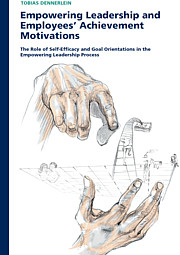Empowering Leadership and Employees’ Achievement Motivations: The Role of Self-Efficacy and Goal Orientations in the Empowering Leadership Process Defended on Thursday, 16 March 2017
Empowering leadership, the process of engaging in behaviors that enable sharing power with an employee, is both “en vogue” and a promising lever for organizations to bring out the best in employees. Yet, being an effective empowering leader is as challenging as it is important. This dissertation aims to advance our knowledge of when and why empowering leadership is most effective. Specifically, in three studies this dissertation examines the role of employees’ achievement motivations (i.e., self-efficacy and goal orientations) as boundary conditions of empowering leadership and identifies key processes that link empowering leadership to individual performance.
The first study examines the question whether empowering leadership would have a decreasing marginal effect on employee performance and might be overburdening for employees at too high levels. Moreover, we argue that employees’ generalized work-role self-efficacy beliefs would qualify this relationship. Our findings from a multi-source field study in the U.S.A. support this view. It shows that empowering leadership has a positive, decreasing effect on employees’ creativity and in-role performance for employees low on work-role self-efficacy, but no effect for employees high on work-role self-efficacy.
The second study focusses on employees’ goal orientations as determinants of employees’ sensitivity for empowering leadership’s implications for the psychological states of meaning and competence, and on how these states relate to creativity and in-role performance, respectively. We posit that empowering leadership positively effects job meaningfulness and, subsequently, creativity for employees high on learning goal orientation. For employees high on performance orientation, we predict that empowering leadership impacts in-role performance via the psychological state of competence. Results from a multi-source field study in the Netherlands confirm our predictions for both the learning and performance avoid goal orientations.
The third study investigates a cross-level effect of team empowering versus directive leadership on individual creativity. We propose that empowering leadership triggers a team coordination process and predict that – depending on their goal orientations – team members would vary in the extent to which their individual creativity benefit from this process. In a laboratory group experiment we find that team members with a learning goal orientation benefit more from empowering leadership and team direction of information exchange than do team members holding performance goal orientations.
Keywords
Empowering leadership, psychological empowerment, goal orientations, self-efficacy, achievement motivations, creativity












